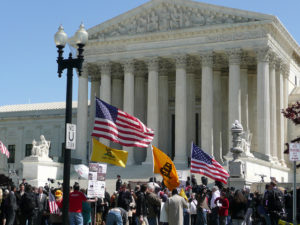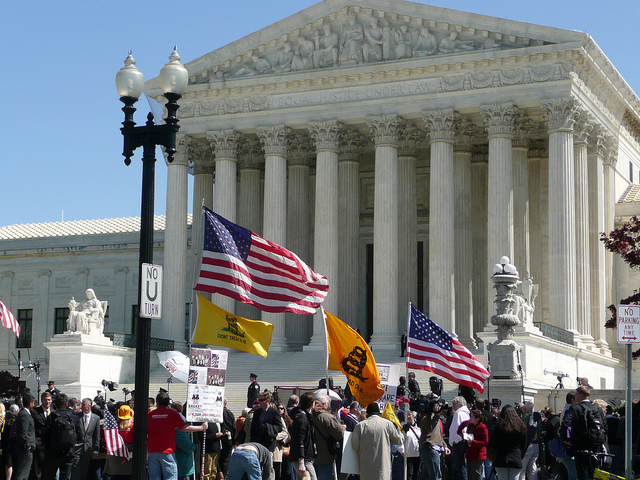 (Atlanta, GA) -Statement from Monica Simpson, Executive Director of SisterSong on today’s Supreme Court rulings in Masterpiece Cakeshop v. Colorado Civil Rights Commission and Azar v. Garza:
(Atlanta, GA) -Statement from Monica Simpson, Executive Director of SisterSong on today’s Supreme Court rulings in Masterpiece Cakeshop v. Colorado Civil Rights Commission and Azar v. Garza:
“This morning, the United States Supreme Court handed down rulings in two different cases that many advocates had been watching closely. In a 7-2 ruling in Masterpiece Cakeshop v. Colorado Civil Rights Commission, the Court ruled in favor of a Colorado baker who refused to bake a wedding cake for a gay couple because of religious objections.
The decision focused on the treatment of the baker by the Colorado Civil Rights Commission. It does not necessarily change the long-standing rule that businesses open to the public must be open to all, but it does leave open the bigger constitutional questions that the case presented.
We are certainly well aware of the history of bus seats and businesses being closed to some people based on other’s beliefs. It is a shameful part of this country’s history – and one that we still today not only in this case, but in the recent slew of very public examples of Black people being harassed, interrogated or even arrested simply while walking down a street or holding a barbecue or just #LivingWhileBlack.
The discussion around businesses and the license to discriminate is about more than cakes when we are seeing states push bills that deny LGBT couples the ability to adopt and last year saw a huge increase in violence against the LGBT community. This political climate is deadly for many of us who are pushed to the margins or made invisible. It is also one rife with attacks on access to abortion and the immigrant community.
The ruling Azar v. Garza sits at the intersection of both of these issues. In Garza, the Trump administration tried to prevent Jane Doe, an undocumented, young woman, from terminating her pregnancy. When she sued, the DC Circuit Court of Appeals sided with her and barred the government from blocking her access to an abortion. Her lawyers promptly secured care for her. The Department of Justice then appeal to the Supreme Court asking the justices to reverse the earlier ruling below and to punish Jane Doe’s lawyers for helping her to get an abortion. Earlier today, the Court agreed to vacate the lower court order.
Though the woman at issue in this case has already obtained the abortion she needed, this decision now wipes away a precedent that could have been used to prevent future attempts to detain immigrants in need of an abortion and withhold access to services. Preying on a young woman who is imprisoned by a warped system to push an agenda is disgusting to stay the least.
The good news in the Garza ruling is that the request for sanctions was denied. This was obviously an effort to intimidate the ACLU who was defending Jane Doe and to punish attorneys who simply acted in their client’s interest. In dismissing the Department of Justice’s claims the Court did not specifically spell out how egregious this fear mongering was, but it does challenge the idea that political punishment should be exacted in order to try to scare an attorney away from doing the best job they can for the person they represent.
The rulings today were complicated. They are also examples of the kinds of large debates we are having and just how important it is that we challenge the policies and rhetoric fueling this hateful anti-gay, anti-immigrant climate and the decision makers who would roll back the progress we have made to target the most vulnerable people to impose their personal beliefs.
The intersectional approach of the reproductive justice movement is needed now more than ever. When we look at the decisions coming from the Court we see just how important it is that we tear down the silos and come together to rise up and speak out. Our work to reform a cruel and callous immigration system is not separate and cannot be separated from the efforts to get rid of restrictions on young people’s access to abortion and to ensure that the right to abortion is a reality for anyone who needs care. The ability to create relationships and build our families and to be able to celebrate that love without disrespect or discrimination is inherently linked to the work we do to ensure that we can raise our children in a healthy environment and to control our futures.
It is tough with court cases and litigation because it feels like a part of the system that we don’t have much say in. But that’s not true. Courts matter and nominations matter, so we need to educate ourselves and engage in nomination processes. We need to think about the fact that lawmakers not only write and advance the laws, but also get to vote on who sits on the benches. We must continue to organize and to rally and to vote! For people living on the margins, it is truly our health, our rights, our dignity and our lives at stake!”
###
SisterSong‘s mission is to strengthen and amplify the collective voices of indigenous women and women of color to achieve reproductive justice by eradicating reproductive oppression and securing human rights.

There are no comments
Add yours